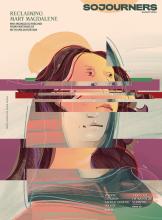YOU, FAITHFUL CHURCH workers, have survived the demands of Lent, Holy Week, Easter, and Pentecost, and I’m willing to wager you are tired. By this time in the liturgical cycle, I’m usually exhausted and my spiritual (and sometimes physical) walk includes a pronounced limp. Vocational and social demands have taken their toll, not to mention the profound collective trauma we have all been through. Two years ago this summer, the waves of direct action in response to the police killings of Breonna Taylor and George Floyd left many of us particularly drained. And the shootings have not stopped. We have all done and been through so much.
Throughout the New Testament, the text refers to faith using the Greek word pistis. That word can also translate as faithfulness, a dogged determination that refuses to acquiesce or let anyone stifle it. It’s the same faith exercised by the woman with the flow of blood and shown in the litany of ancestors in Hebrews 11. It is more than sentimental, and sometimes is best exercised by simply being still and remembering who God is.
Our scriptures this month encourage us to exercise and examine our faith so that we keep going forward, even if we must stop and reset ourselves. Whether our posture is active or passive, our faith is still called into action because the world needs our witness.
Read the Full Article

